Current Affairs
Obama, Clooney and Gates: ‘We can end child marriage in a generation’
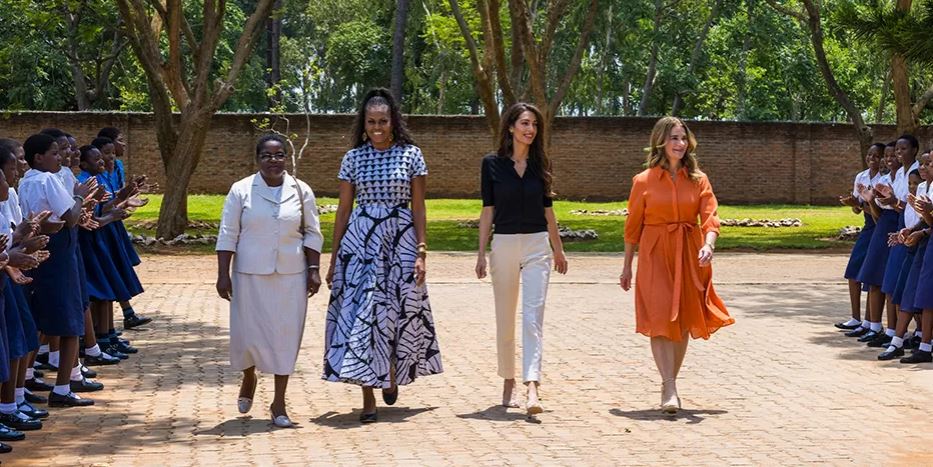
Three of the world’s most influential women have told BBC News they want to end child marriage within a generation.
Michelle Obama, Amal Clooney, and Melinda French Gates announced last year a collaboration between their foundations to combat the problem.
At the current rate of progress, the UN has warned it will not be eradicated for 300 years.
But former First Lady Mrs Obama told BBC News: “It is an issue that can be solved tomorrow.”
The three women spoke exclusively to BBC 100 Women during a visit to Malawi and South Africa.
“I’m sorry,” said 26-year-old Lucy, as she choked back tears. “I feel emotional.”
Lucy was in the library of Ludzi Girls Secondary School in the central region of Malawi. US Secret Service agents stood outside, under the red flame trees of the school grounds. She had just been speaking about the importance of girls staying in school, and spared the fate of marriage to much older men before emotion suddenly overcame her.
Around the table, three of the world’s most influential humanitarians – Melinda French Gates, Amal Clooney, and Michelle Obama – had quietly listened to her story.
According to the NGO, Girls Not Brides, Malawi has one of the highest child marriage rates in Eastern and Southern Africa, with 42% of girls already married by the age of 18. In Mchinji District, where Ludzi Girls school is located, 33% of girls are reported to fall pregnant before they reach 18, and leave education.
Lucy could have been one of those girls. Her father had wanted her out of school when she was 14, but she resisted and later became the first girl in her village to go to university. Now, with a degree in education, she is a district leader for AGE Africa, an organisation that provides scholarships for vulnerable girls in Malawi, a country where secondary education is not free. Lucy was once a student in the programme, and now she helps girls like herself.

Her mother is overjoyed at her achievement, Lucy said, although her father is less so. She said he is still coming to terms with an independent daughter. Sharing all this left her overwhelmed.
The former First Lady of the US, sitting to Lucy’s left, spoke up. “Will you send your father a message for me? Next time you see him, tell him that Michelle and Barack Obama are so proud of you, and the woman you have become.”
Lucy looked up, smiling. On Lucy’s right sat international human rights barrister Mrs Clooney. “And tell him you have a lawyer too now,” she added.
After announcing their collaboration to combat child marriage last year, Michelle Obama, Amal Clooney, and Melinda French Gates visited Malawi and South Africa together to amplify the work of grassroots organisations focusing on the issue, and to meet girls and women whose lives have been affected.
Mrs. Obama’s education-focused organisation, Girls Opportunity Alliance, had already identified that girls around the world were leaving school due to pregnancy and teenage marriage. Mrs Clooney was working to make sure girls in rural communities were aware of their rights, and many of Ms. French Gates’s projects had focussed on improving healthcare – including treatment for girls who experience complications after giving birth at a young age.
All are passionate about defending the rights of women and girls, so a coalition seemed like a natural fit.
“It’s been a really lovely and very organic partnership, and friendship, between the three of us,” international human rights lawyer Mrs Clooney told BBC 100 Women.
“In an early conversation with the Gates Foundation, I said: ‘You’re working on gender justice at a massive scale, but mostly you’re not using law as a tool. You’re looking at economics, and you’re looking at health. Maybe we can form a partnership?’”
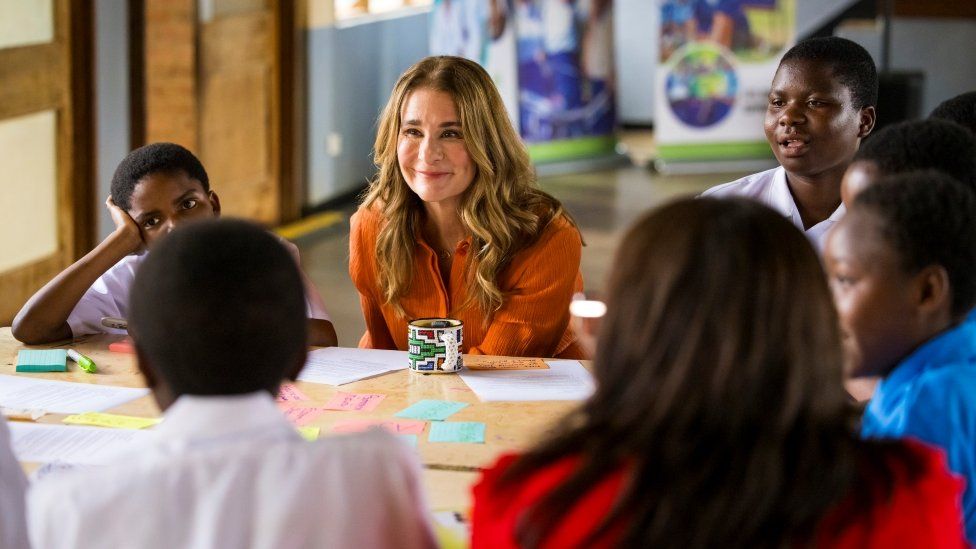
Ms French Gates, who got a spontaneous cheer from the Ludzi schoolgirls when she said it was her fifth visit to Malawi, said working together was a strategic decision, and that their overlapping areas of expertise would make them more effective.
“Women, I think, naturally work in collectives,” she told the BBC. “I’ve talked to a number of women who are older than me who made it as CEO, or CFO, in their company. And there’s some regret that they didn’t do it in concert with other women. They didn’t pull other women up and along with them. The generation that we’ve been part of – Michelle and I are essentially the same age – we’ve wanted to pull everybody up with us.”
According to Unicef, 650 million girls and women are alive today who married under the age of 18, and currently, more than 12 million girls a year marry in legal and traditional ceremonies around the world. South Asia and Sub-Saharan Africa have the highest rates globally, but this is not just an issue in the global south. Five states in the US have no minimum age of marriage as long as parents consent.
Some countries, such as Malawi, have progressive laws that outlaw marriage under the age of 18, although these often come up against longstanding cultural barriers. On Monday, following the visit of the three campaigners, President Lazarus Chakwera announced further funding for a national strategy to end child marriage. Until now there have been very few prosecutions.
Mrs Clooney thinks outreach is a solution. Her Waging Justice for Women program funds the Women Lawyers Association of Malawi, which arranges for specialists to travel to rural communities to seek out women looking for help. More than 85% of Malawi’s population lives in villages, set in expanses of land governed by chiefs, living in huts under baobab trees, miles from roads and electricity.
“We formed a network of mobile legal aid clinics, which means literally, there’s a van that goes out with lawyers, and we go out in a community and say to girls, ‘These are your rights. If you need a lawyer – for free – to protect you, we are here.
“We wage justice, and we say ‘waging’ because you can’t assume it’s going to happen,” Mrs Clooney said. “You have to form alliances and fight against these kinds of injustices with the determination that it takes to win a war.”
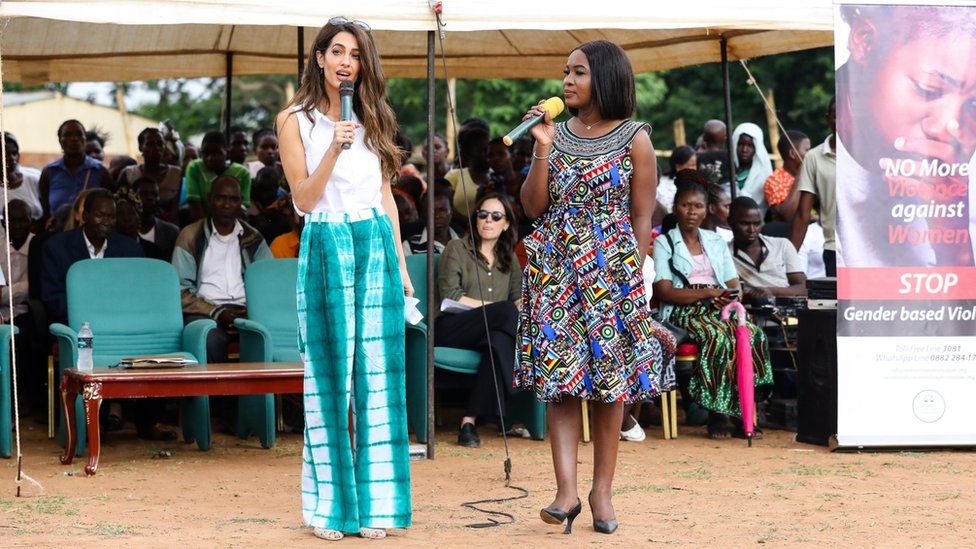
The BBC visited a legal clinic under a makeshift tent in a village in Mchinji district – it had more than 1,000 attendees, mostly women. Some were pregnant teenagers, asking what they could do to stay in school after giving birth.
“I see myself in the girls that we’re fighting for,” Mrs Obama told the BBC. “I see my daughters in those girls.”
There is, however, concern this issue has no solution, at least in the short term. In a report earlier this year, Unicef said child marriages now made up 19% of all marriages, down from 23% 10 years ago. But it added that eliminating child marriage could still take about 300 years.
“This is an urgent issue,” said Mrs Obama. “We can’t afford to ignore it and assume that we can make headway on all the other big stuff that we’re trying to deal with – poverty, climate change, war, and the rest – unless we’re doing right by 50% of our population.
“It is an issue that can be solved tomorrow. If all the world leaders got together and made it a priority, it wouldn’t take 300 years. It could happen in less than a generation.”
Michelle Obama, Amal Clooney, and Melinda French Gates chose to visit Malawi because each of their programs was already supporting projects in the country. What form their long-term collaboration will take is still being worked out, but for now, the women say they will back in-country organisations that have been working with communities for years.
“Large-scale international organisations that are supposed to be dealing with this, like the UN Security Council, like powerful governments, are not delivering,” said Mrs. Clooney. “So I think philanthropy and individuals have to play a larger role.”
©BBC News
Current Affairs
New survey points to coalition-led SA, but voter apathy a major factor
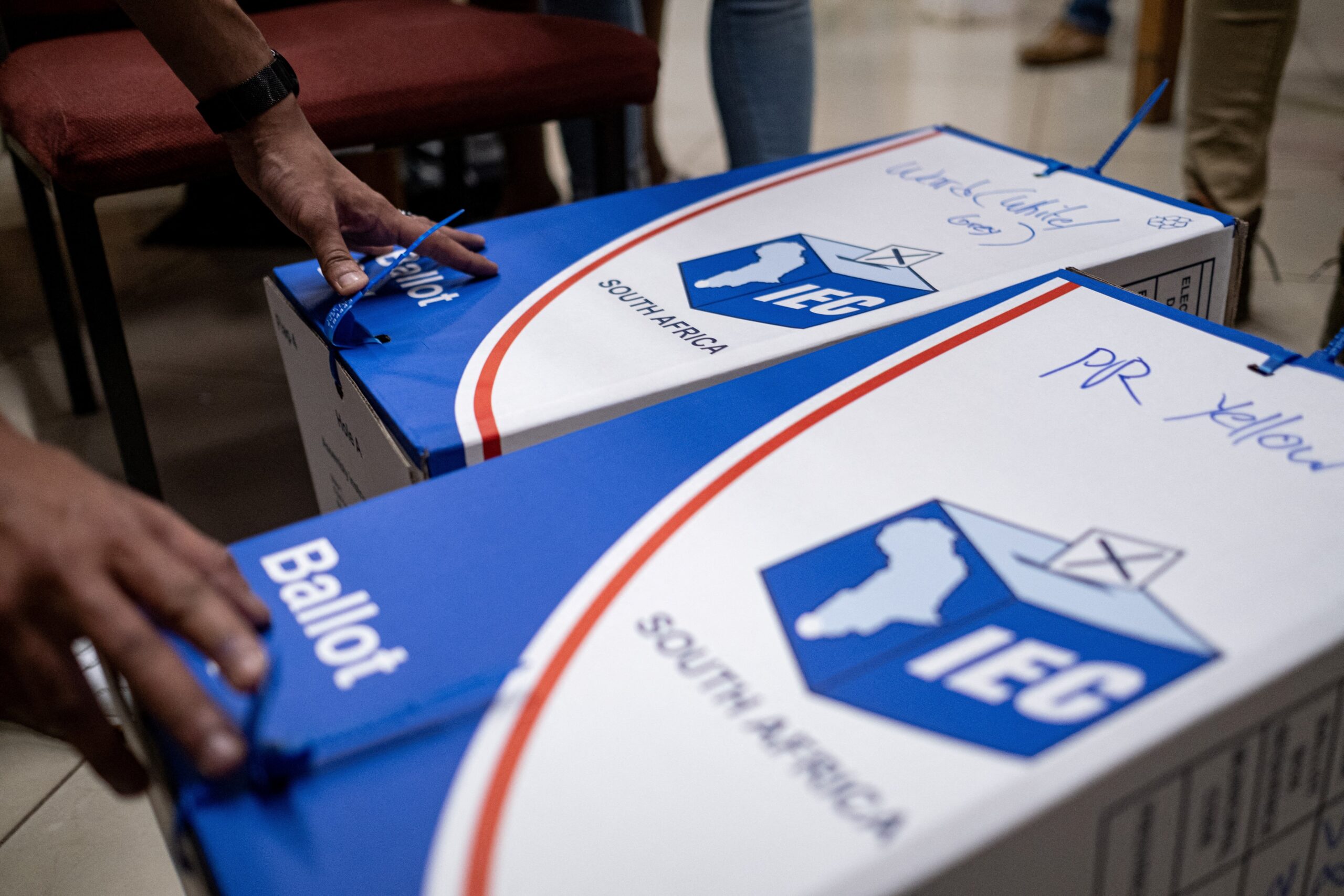
The results of an in-depth survey conducted by African Innovation Research SA (AIRSA) point to the country’s future being in the hands of coalitions and raise concerns about voter apathy, especially among the youth.
The initial sample comprised some 5 000 participants, of whom 46% confirmed they were either not interested in voting despite being registered or had not registered.
The majority of those surveyed by the independent research company based in Cape Town were in the 18–35 age group, a generation who are increasingly disillusioned with how the country is run.
The remaining 2 700 participants, who were interviewed from across a broad section of South Africa’s nine provinces, indicated that support for the ruling ANC is in decline, dipping below the 50% mark to 43% overall.
The ANC’s strongholds remain the Eastern Cape (61% of those surveyed), 58% in the Free State and 65% in Limpopo, where its challenger is the EFF at 23.7%.
In the country’s fourth-largest economy, Mpumalanga, the ANC leads with 52.3%, the EFF at 21.7% and the DA at 19.7%.
In the North West province, it’s a similar pattern, albeit reversed, with the ANC at 48.3%, the DA at 27.7% and the EFF at 20.0%, while in the Northern Cape, the ANC leads with 47.3%, followed by the DA with 24.3% and the EFF with 15.7%.
The country’s economic engine, Gauteng, is a key player in the power dynamics. Here, the ANC garnered 38.7%, but the EFF is growing its base to 19.3%, challenging the DA’s 20% of the province’s voters.
In the Western Cape, as expected, the DA holds onto a leading margin at 46.0%, with the ANC and EFF at 22.3% and 8.7% respectively. Gayton McKenzie’s Patriotic Alliance (PA) also features in the country’s southernmost province, making a notable showing at 5%.
While former president Jacob Zuma may have been barred from becoming a member of Parliament in the Constitutional Court this week, the new uMkhonto weSizwe Party (MKP) will play a pivotal role in KwaZulu-Natal. Results of the AIRSA survey show that while the ANC currently remains ahead with 28.7%, it’s an even race in the province with similar support for the IFP at 26.0% and MKP at 26.7%.
As experience dictates, the smaller parties will begin a series of bargaining tactics as to whose deck they end up in and call the shots.
At collectively accounting for around 20% of the upcoming vote, these potential coalition partners carry significant influence.
AIRSA also noted that voting in this sector is personality-driven as opposed to ideology.
The fragmentation of South Africa’s political landscape could also contribute to increasing dissatisfaction and disillusionment, particularly when linked to the country’s youth and increasing unemployment.
© IOL (Cape Times)
Current Affairs
Diddy assault video cements fall of hip-hop icon
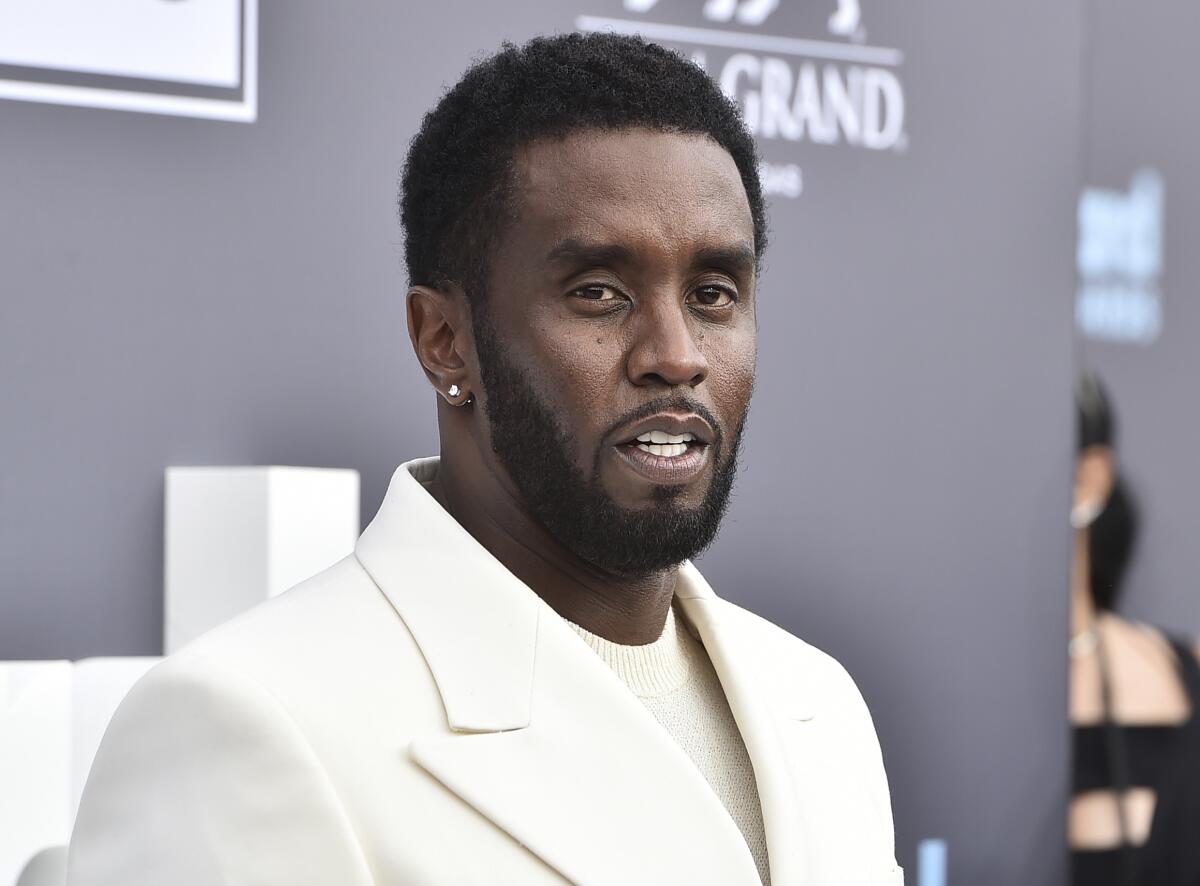
CCTV video footage confirmed what many people in the music industry knew was brewing: a moment of reckoning for one of the most influential hip-hop artists in history.
The clips of Sean “Diddy” Combs kicking his former girlfriend Cassie Ventura – as she lay motionless on the floor – cemented his downfall, despite his apology after the leak.
“I don’t see a path for him to come back from this,” said Amy DuBois Barnett, the former editor-in-chief of Ebony magazine, who has written about hip-hop culture.
Combs’ reputation in the industry had been “chequered for some time,” added Barnett. “Many people were aware of his pretty unbridled temper.”
Combs – formerly known as P Diddy, Puff Daddy or Puffy – is one of the best-selling and most acclaimed artists of all time, with three Grammy Awards and millions of record sales to his name.
For years, nothing really affected his rise to icon status as an artist, producer and businessman. There were negative stories in the industry, said Barnett, but much of it stayed out of the public eye.
Last November, Ms Ventura settled a lawsuit against Combs – in which she accused him of rape and sexual trafficking – for an undisclosed sum. But Combs’ lawyer said the settlement was “in no way an admission of wrongdoing”.
Celebrities continued to voice support for him, but that ended with the CCTV video obtained by CNN and published last week.
The assault shown in the footage is brutal. After kicking Ms Ventura like a football, Combs, wearing just a towel, is seen dragging her across the floor.
The video appears to be a compilation of surveillance footage angles dated 5 March 2016, which CNN said was filmed at the InterContinental Hotel in Century City, Los Angeles. In her lawsuit, Ms Ventura had described a March 2016 incident at that hotel, in which Combs allegedly attacked her.
A string of other lawsuits have since been brought against Combs for abuse, sexual misconduct and rape. The latest was filed on Tuesday by Crystal McKinney, a former model and winner of MTV’s 1998 Model Mission competition.
She claimed she was “drugged and sexually assaulted” in 2003 by Combs following a fashion event in New York. BBC News has contacted Diddy’s representatives for comment on the claims.
When the first lawsuits were filed, the rapper called the accusations “sickening” and said the alleged victims were looking for “a quick pay day”.
But the video of the assault on Ms Ventura undermined those denials.
Combs was silent for two days after its release, before posting an apology to Instagram, admitting it was him in the tape and calling his actions “inexcusable”.
“I was disgusted then when I did it,” he said, “and I’m disgusted now.”
“I went and I sought out professional help,” he continued. “I got into going to therapy, going to rehab. I had to ask God for his mercy and grace. I’m so sorry.”
Combs did not mention Cassie Ventura in his apology, and her lawyers hit back, saying: “Combs’ recent statement is more about himself than the many people he has hurt.”
The apology was “too little too late,” said Camron Dowlatshahi, an entertainment lawyer in Los Angeles. “It shows the short-sightedness of Diddy, thinking he’s not going to be held accountable and that he has enough money to take care of everything.
Barnett, who has written about misogyny in the rap industry, described the statement as “the most ill-advised apology ever”. She suggested it was from the “classic ‘famous man’ playbook: deny, deny, deny. Get caught. Apologise, then talk about going to therapy.”
“No-one’s taking it seriously, particularly because he previously accused Cassie and others of being gold-diggers. That really angered a lot of people in the music industry.”
In April, news helicopters on both the US east and west coasts filmed police raids on mansions linked to the rapper. They were part of an ongoing criminal investigation by law enforcement into sex trafficking.
The man who was idolised as a hip-hop legend has been lying low since then.
Family pictures with his daughters posted to Combs’ Instagram account are in stark contrast to the images of him carrying out a violent assault.
The Los Angeles District Attorney’s Office said on Friday that it would not be able to bring charges due to the statute of limitations for assault. So where does the CCTV video, and the ongoing investigation, leave his career?
In his music, Diddy has often relied on collaborations with other A-list stars. His last album featured Mary J Blige, The Weekend, 21 Savage, and John Legend. He is extremely unlikely to be able to recreate such productions now.
But whether there will be an effect on his vast number of listeners is less clear. Fitness company Peloton has banned his music from its workout playlists already, according to TMZ, but other companies are yet to comment.
R Kelly continues to get millions of monthly listeners on Spotify, despite convictions for child sexual abuse.
Meanwhile, Kanye West experienced a peak in his monthly listeners last year, despite being dropped by brands for expressing antisemitic views.
Those who passed by Diddy’s star on the Hollywood Walk of Fame this week reflected on what the video meant to the rapper’s fans.
“It’s career-ending. I don’t know how he’s going to come back from this,” said Mar Anthony, a Los Angeles local. “I was a fan when I was a kid, listening to Every Breath You Take (I’ll Be Missing You). But what he did and the music, they’re two different things.
“It’s the same thing with Michael Jackson,” he said, nodding towards another Walk of Fame star that lies not far away – in an apparent reference to allegations of child abuse made against that star.
Diddy “definitely deserves what is coming to him”, said Prince Laurenz Hamlin, who was visiting LA. “But he still has built a legacy in the music industry. I think people will have to separate the art from the artist.”
One woman, after snapping a photo of Combs’ star, simply muttered “predator” as she walked away.
It is unclear who is currently advising Sean Combs. The law firm that previously issued denials on his behalf has said it no longer represents him.
Despite the civil lawsuits there have been no criminal charges filed against him. But the ongoing police investigation will no doubt be weighing heavily on the rapper.
“The Department of Homeland Security was involved [in the raids],” said Mr Dowlatshahi. “Just that fact alone shows the severity of what’s going on here.”
© BBC News
Current Affairs
Iran’s supreme leader leads prayers at Raisi funeral
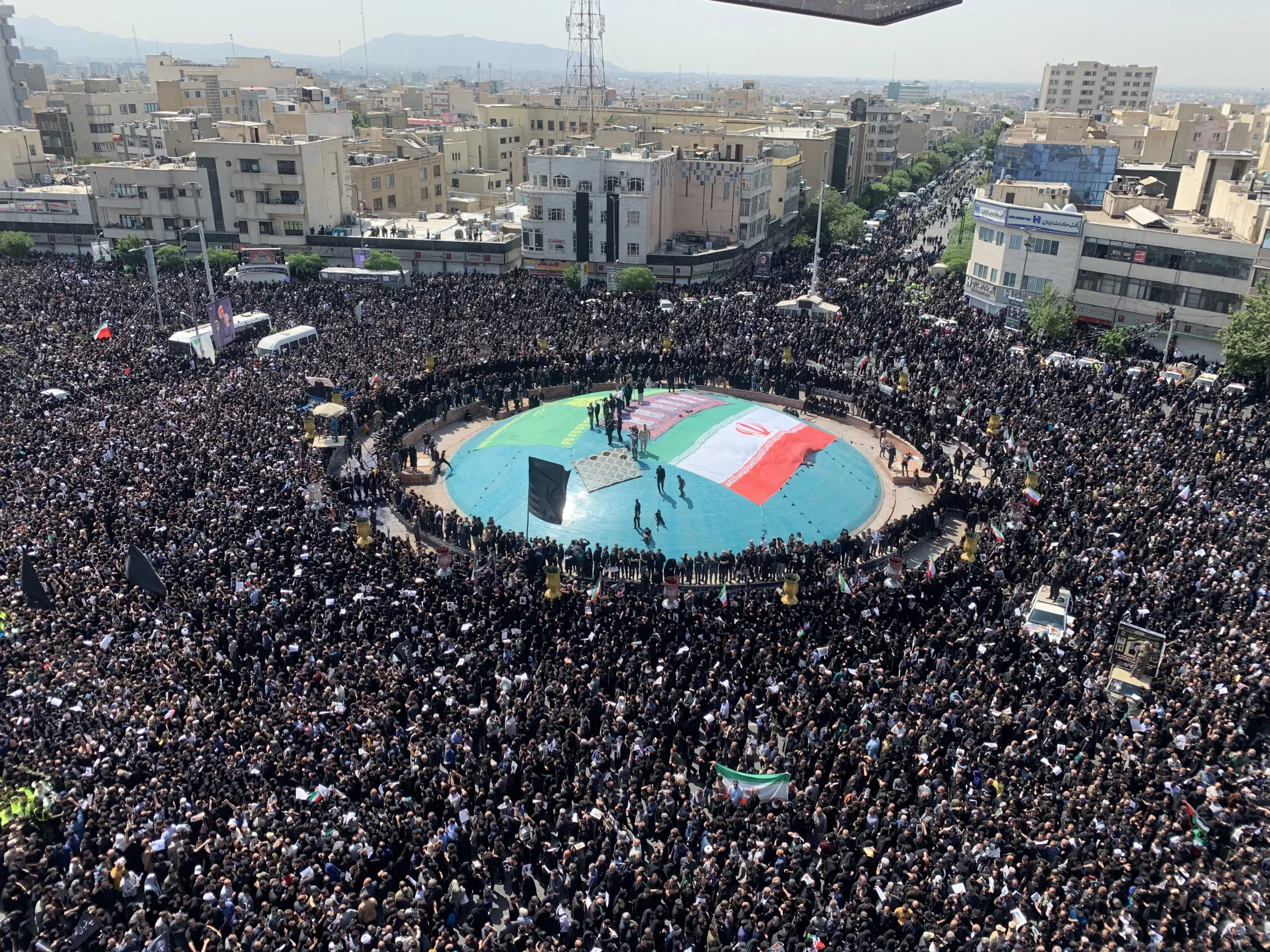
Iran’s supreme leader has presided over a funeral for the country’s late president, foreign minister and others killed in a helicopter crash on Sunday.
Ayatollah Ali Khamenei led prayers at Tehran University, where caskets carrying the dead were draped in Iranian flags.
President Ebrahim Raisi died alongside Foreign Minister Hossein Amir-Abdollahian and six others in a helicopter crash near the border with Azerbaijan.
Authorities had warned against demonstrations against the funeral procession and insults posted online.
“Oh Allah, we didn’t see anything but good from him,” Ayatollah Khamenei said in the standard prayer for the dead in Arabic.
Iran’s acting president, Mohammad Mokhber, stood nearby and openly wept during the service.
People then carried the coffins out on their shoulders, with chants of “Death to America” heard outside.
They loaded them onto a trailer for a procession through downtown Tehran to Azadi Square, where Raisi gave speeches in the past.
In attendance were top leaders of Iran’s paramilitary Revolutionary Guard, one of the country’s major power centres.
Also on hand was Ismail Haniyeh of Hamas, the militant group that Iran has armed and supported during the ongoing Israel-Hamas war.
Haniyeh is widely considered Hamas’s overall leader and has been a prominent member of the movement since 1980. The US Department of State designated him a terrorist in 2018.
“I come in the name of the Palestinian people, in the name of the resistance factions of Gaza…to express our condolences,” Haniyeh said.
He also described meeting Raisi in Tehran during Ramadan, the holy Muslim fasting month.
He said he heard the president say that “the Palestinian issue” remains the key one of the Muslim world, which “must fulfil their obligations to the Palestinians to liberate their land”.
He also claimed that Raisi called Hamas’ October 7 attack in Israel, which saw 1,200 people killed and 250 others taken hostage, an “earthquake in the heart of the Zionist entity”.
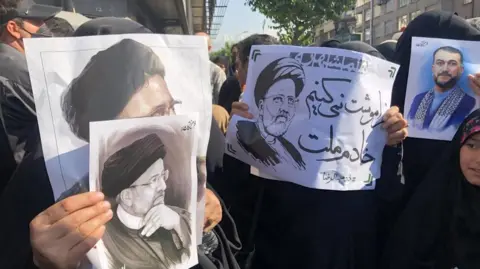
Also expected to attend services in Tehran were Pakistan’s Prime Minister Shehbaz Sharif and a delegation from the Taliban of Afghanistan, which included their Foreign Minister Amir Khan Mutaqqi.
Iran’s theocracy declared five days of mourning over Sunday’s crash, encouraging people to attend the public mourning sessions.
Typically, government employees and schoolchildren attend such events en masse, while others take part out of patriotism, curiosity or to witness historic events.
For Iran’s Shiite theocracy, mass demonstrations have been crucial to demonstrating the legitimacy of their leadership since millions thronged the streets of Tehran to welcome Grand Ayatollah Ruhollah Khomeini in 1979 during the Islamic Revolution, and also attended his funeral 10 years later.
An estimated one million turned out in 2020 for processions for the late Revolutionary Guard General Qasem Soleimani, who was killed in a US drone strike in Baghdad.
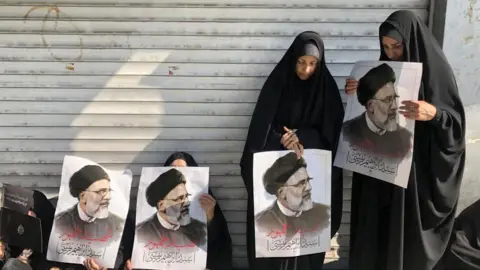
Across the capital, large banners were raised hailing Raisi as “the martyr of service”, while others bade “farewell to the servant of the disadvantaged”.
Some residents in Tehran received texts urging them to attend Wednesday’s ceremonies, the AFP news agency reported.
Footage carried by state TV showed streets filled with mourners, many of whom were carrying pictures of Raisi or the Iranian flag.
Funeral rites for the men began on Tuesday in the city of Tabriz and the Shiite clerical centre of Qom, where thousands of mourners attended ceremonies.
After Wednesday’s procession in the capital, Raisi’s remains will be moved to South Khorasan province, before being transferred to his home city of Mashhad in the northeast.
He will then be buried on Thursday evening in the city after funeral rites at the Imam Reza shrine.
Raisi, a hardline cleric, was a highly divisive figure in Iran. In the 1980s, he oversaw the execution of scores of opposition activists while working as a prosecutor.
He unleashed a brutal crackdown against demonstrators angered by the killing of 22-year-old Mahsa Amini in 2022. She died three days after she was detained by morality police in the capital for allegedly violating Iran’s strict rules requiring women to cover their hair with a hijab, or headscarf.
But his ultra-conservative outlook won favour with supporters of the regime, and Raisi was viewed as a possible successor to Ayatollah Khamenei.
© BBC News
Current Affairs
Shoprite to cooperate with police after Heidelberg man dies following alleged confinement in store cold room
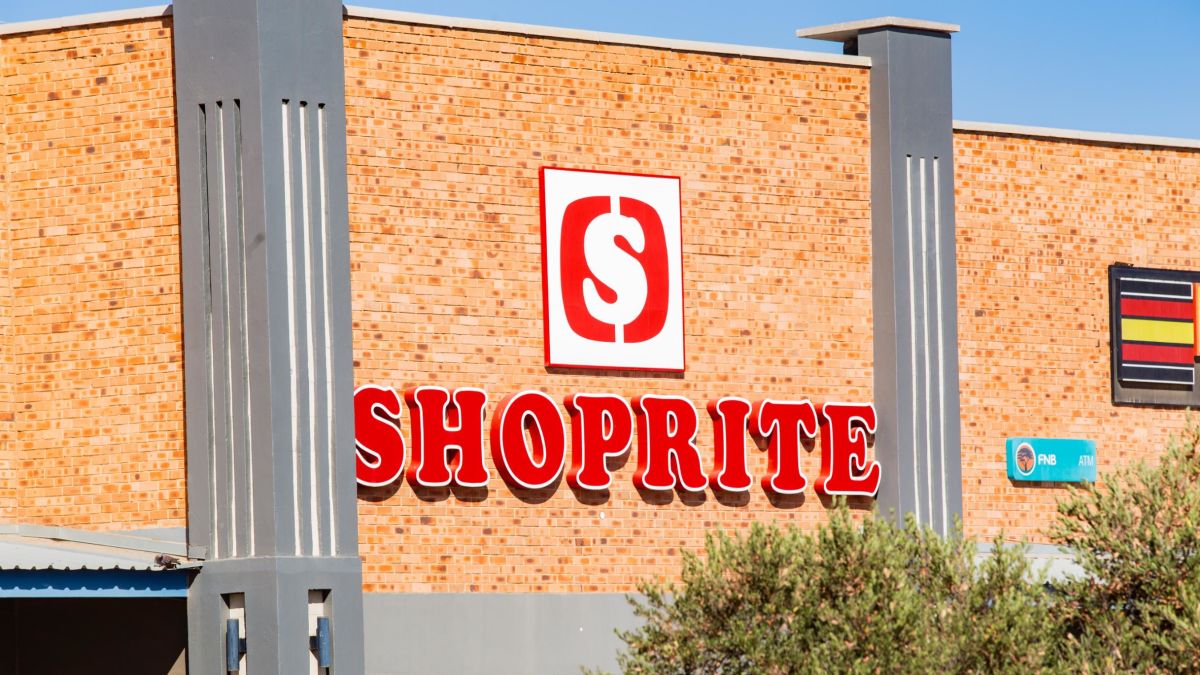
Without divulging any details regarding the allegations over the death of a Gauteng man, retailer Shoprite stated that they would cooperate with the South African Police Services (SAPS).
IOL initially reported that a 13-year-old boy who was accused of stealing a chocolate, had been locked in a cold store room, where he subsequently died.
However police have clarified that the victim is 33-years-old.
Gauteng police spokesperson Colonel Noxolo Kweza said Ratanda police have opened a case of assault common as well as an inquest docket.
“This follows an alleged incident where two men accused of shoplifting were locked at the back of the store.
“One of the men, aged 33, during closing time complained of stomach aches, paramedics were called and he was declared dead on the scene.”
It is alleged a 33-year-old man was accused of stealing a bar of chocolate from a Shoprite store in Ratanda in Heidelberg, south of Gauteng.
When approached for comment, the supermarket chain extended its condolences to the victim’s family following their loss.
“The allegations are seen in an extremely serious light and the necessary steps will be taken pending the outcome of a full investigation.
“We cannot comment on the details of the incident as it is a police matter, and the local South African Police Service (SAPS) should be contacted for more information.
“We always give our full cooperation and provide all available information to the SAPS to assist their investigation.”
On Monday, angry community members gathered outside the store demanding answers.
© IOL




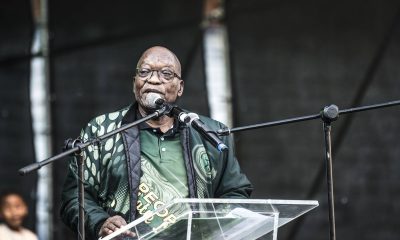

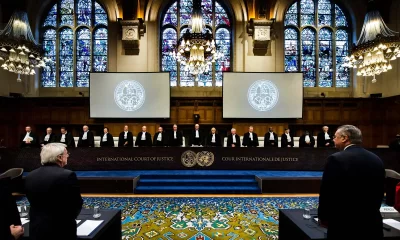

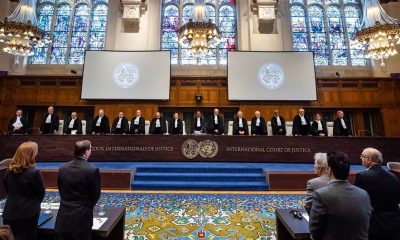

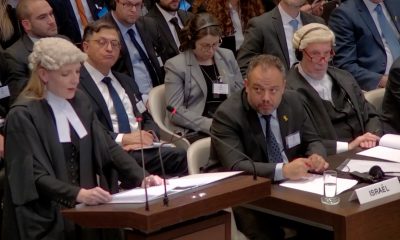







You must be logged in to post a comment Login